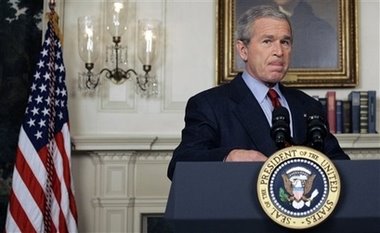HOW PRESIDENT BUSH VIEWS THE FURIOUSLY FAST CHANGING WORLD

From the Washington Post :
Go Here For The Full StoryIn speeches, statements and news conferences this year, the president has repeatedly declared a range of problems "unacceptable," including rising health costs, immigrants who live outside the law, Noth Korea's claimed nuclear test, genocide in Sudan and Iran's nuclear ambitions.
Bush's decision to lay down blunt new markers about the things he deems intolerable comes at an odd time, a phase of his presidency in which all manner of circumstances are not bending to his will: national security setbacks in North Korea and Iraq, a Congress that has shrugged its shoulders at his top domestic initiatives, a favorability rating mired below 40 percent.
But a survey of transcripts from Bush's public remarks over the past seven years shows the president's worsening political predicament has actually stoked, rather than diminished, his desire to proclaim what he cannot abide. Some presidential scholars and psychologists describe the trend as a signpost of Bush's rising frustration with his declining influence.
In the first nine months of this year, Bush declared more than twice as many events or outcomes "unacceptable" or "not acceptable" as he did in all of 2005, and nearly four times as many as he did in 2004. He is, in fact, at a presidential career high in denouncing events he considers intolerable. They number 37 so far this year, as opposed to five in 2003, 18 in 2002 and 14 in 2001.
Through a spokesman and then in a televised statement, he declared North Korea's claimed nuclear test "unacceptable" before and after it occurred Oct. 9. But he could also be heard on Jan. 9 lecturing students at an elementary school in Glen Burnie, Md., that their recent scores on math and reading proficiency tests were "unacceptable."
Having a president call something "unacceptable" is not the same as having him order U.S. troops into action. But foreign policy experts say the word is one of the strongest any leader can deploy, since it both broadcasts a national position and conveys an implicit threat to take action if his warnings are disregarded.
Bush's use of the term "reflects in some ways his frustration with a world that doesn't seem as amenable to his policies as he would like them to be," said Stanley A. Renshon, a political scientist at the City University of New York. Bush "has strong views; he believes in doing what is right. All of those things give an emotional force to his response" to events he often sees and describes without nuance.
Renshon, who wrote a mostly-favorable book in 2004 about Bush's psychology, said the president's declarations are in keeping with his apparent self-image as a Jeremiah, "railing against the tides" and saying what "people ought to be doing something about."
As such, charting the ebbs and flows of Bush's proclamations of "unacceptability" provides clues to trends in presidential irritations. It also demonstrates that Bush's most intense grievances -- like his attention -- have moved offshore, as evidenced this year by his eight declarations about "unacceptable" events in Iraq, and his 11 declarations about unacceptable behavior by Iran.
*******************Asked at a news conference on Wednesday whether Washington risks looking feckless in making such categorical statements without taking decisive action, Bush said: "It's very important for the American people and North Korea to understand that that statement still stands. . . . I know this sounds [like] just saying it over and over again, but it's -- rhetoric and actions are all aimed at convincing others" to join Washington's effort to impede that country's weapons ambitions.
******************
Bush's proclamations are not the only rhetorical evidence of his mounting frustrations. One of his favorite verbal tics has long been to instruct audiences bluntly to "listen" to what he is about to say, as in "Listen, America is respected" (Aug. 30) or "Listen, this economy is good" (May 24). This year, he made that request more often than he did in a comparable portion of 2005, a sign that he hasn't given up hope it might work.